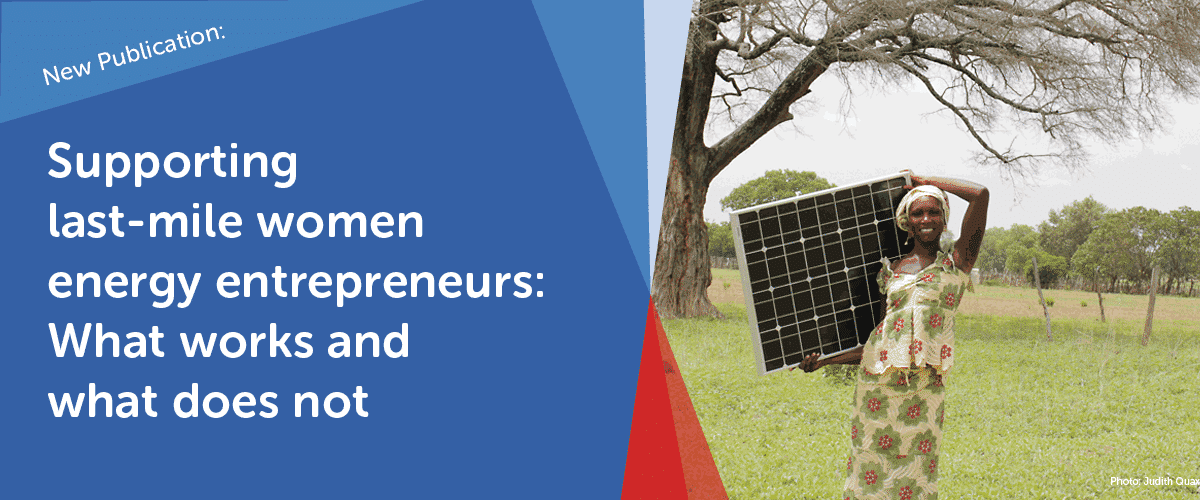ENERGIA presents a new publication “Supporting last-mile women energy entrepreneurs: What works and what does not”. The document looks at the lessons learned, unsuccessful and productive strategies over a four-year journey on the field with five leading partners working in developing women’s enterprises in the renewable energy sector in hard to reach areas.
One billion people live daily without electricity. Close to three billion don’t have access to clean cooking solutions and the exposure to biomass smoke cause millions of deaths each year, mostly among women and children. At the same time, women are the main users of household energy. If properly engaged in the supply chain, women can play a crucial role in moving forward towards energy access for all and the poverty reduction requested by the 2030 Agenda for Sustainable Development.
In this belief, over the past 4 years (2014-2018) ENERGIA has been working towards developing women-led enterprises in the energy sector through its Women’s Economic Empowerment (WEE) programme and it is delighted to release a new publication titled “Supporting last-mile women energy entrepreneurs: What works and what does not”, result of the work in seven countries with five leading partners.
This new publication examines, analyses and presents models and strategies experienced during the implementation of the WEE programme, describing successful approaches, together with failures. Together with its partners, ENERGIA has supported 4,153 women, delivering clean energy products and services to more than 2.9 million consumers, mostly in rural areas and in low-income communities.
The programme was launched in 2014, following the growing belief that women and their networks can contribute effectively in energy access interventions, especially when it comes to bringing energy services to last-mile communities. The WEE programme, designed to be holistic and multilateral, has integrated various measures to realize women entrepreneurs’ potential. From energy generation to its end users, women have been involved in the overall energy value chain. The WEE approach offers an integrated package to tackle the specific gender barriers that women entrepreneurs face.
Women are change agents and this document accentuates that we must walk alongside women and girls to address the deep gender inequalities that exist in energy access. By selling, servicing and financing energy products services, surrounding and distant communities, women entrepreneurs can engender positive changes in the lives of their families and communities.
As a learning document, this publication answers to central questions, such as why working with women’s energy enterprises is pivotal to sustainable development and its possible outcomes. Based on ENERGIA and partners’ experience, it draws lessons learned from each aspect of the programme, from recruitment of women entrepreneurs to their training and mentoring. It further presents the strategies for sales, marketing and promotion, supply chain development, management and distribution. It also looks into the major bottleneck for women-run enterprises: access to finance.
Purpose of this document is providing organizations working on women’s enterprise development, partners, governments, or practitioners interested in supporting women’s enterprises in the renewable energy sector, with practical information learned at the intersection of women’s empowerment and energy access.
In the coming strategic period (2018-2022), ENERGIA will continue to promote women’s entrepreneurship in the energy sector, to strengthen their active role and amplify their voice in global and national agendas. ENERGIA will expand its activities, by engaging private and public sectors, manufacturers, suppliers and distributors, as well as financing institutions to move further towards leaving no one behind.
The full publication “Supporting last-mile women energy entrepreneurs: What works and what does not” can be accessed and downloaded here.
*A special mention goes to all partners who implemented the ENERGIA Scaling-up Energy Access through Women’s Economic Empowerment Programme. They are: Centre for Rural Technology Nepal, Energy 4 Impact, Kopernik, National Association of Community Electricity Users Nepal, Practical Action Consulting Nepal, Practical Action Eastern Africa, Sustainable Community Development Services, Social and Ecological Management Fund, and Solar Sister. The programme would not have been possible without the funding and trust we received from our donors: the Swedish International Development Agency, the Norwegian Agency for Development Cooperation and the Ministry of Foreign Affairs of Finland.











Follow us on: